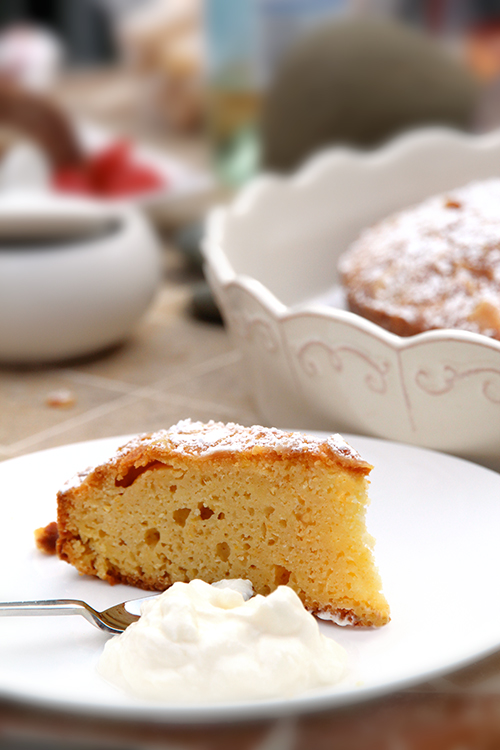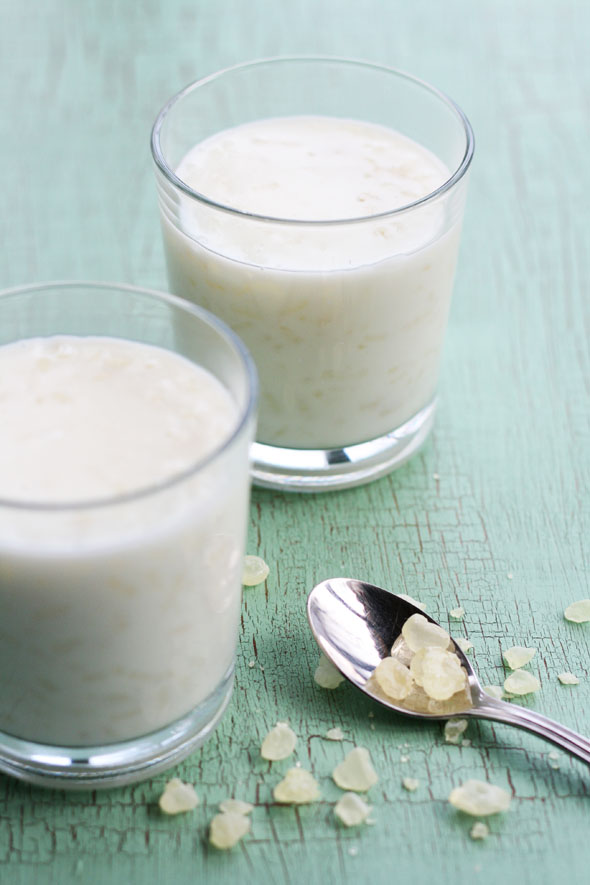Greek Orange Cake with Honeyed Yoghurt for my mum's birthday
If it wasn't for Tony quietly practicing a few Greek words with my dad in the back corner of my sister's back garden, you wouldn't know the family that gathered together yesterday for afternoon tea was Greek.
Both my parents are Greek but my family is not at all traditional. Growing up we didn't speak Greek, we didn't cook much Greek food and we didn't follow any Greek traditions. Adding to this, my mum, Fifi, is fair-haired and fair-skinned which, to the untrained eye, greatly dilutes our credibility as a 'real' Greek family.
In fact, as a child Fifi looked a lot like Shirley Temple. Her mum even dressed her to look like the child movie star, as you can see below in the Fifi vs Shirley Comparison Table.
I've told you a little about my mum's upbringing in a travelling family, and how connecting with traditional Greek culture wasn't something that came naturally to them. Her father, Nicholas, was a cotton merchant and the family moved from city to city with him for his work.
Coming to Australia in the mid-1950s gave my newly-wedded parents an opportunity to embrace the relaxed and easy-going ways of the Australian lifestyle. They anglicised their surname, gave my sisters and I 'true-blue' Aussie names and spoke only English in the home. The family car was an olive green Holden HR sedan with venetian blinds in the back and we lived in a neighbourhood where everyone, except my sisters and I, had blond hair.
We liked being Aussies. We didn't even really know we were Greek until we met some other kids that went to Greek school on a Saturday and wanted to know why we didn't have to go. Greek school sounded horrible. Any school on a Saturday would have been horrible. We were definitely glad to be Aussies.
This is me with my younger sister Kellie in our sporty matching t-shirt dresses, and our very fashionable mum, standing proudly outside our Australian home of the then very Anglo-saxon suburb of Mount Waverley.
Little did I know then that I would yearn for all things Greek as an adult. I'm now furious that I didn't learn to speak Greek as a child and it's frustrating not to have a built-in knowledge of Greek cooking techniques, but I don't blame my parents. I know they just wanted to fit in.
One of the reasons I started this blog is because of my yearning for a stronger connection with my origins. Without an upbringing enriched with Greek cooking, language and traditions, and with such a strong sense of being Australian, sometimes it's difficult to make that connection. I know deep inside that my heritage is Greek but I have a long way to go when it comes to learning about Greek culture and expanding on my knowledge about Greek food. Unfortunately, learning to speak Greek is something I'm going to have to leave to Tony. After several attempts over the years to learn Greek I've come to realise my adult brain definitely lacks the necessary neurons for learning languages.
It was my mum's birthday yesterday. Traditionally, birthdays are not celebrated by Greeks as much as Name Days. But as you've probably worked out by now, we're not a traditional Greek family. Apart from Christmas, birthdays are the only times the whole family gets together. And when I say 'whole family', I don't mean thousands of cousins. It's just my dad and his wife Julia, my mum, my two sisters and their kids. That's right. That's it. We are sooo not Greek. In contrast though, we have an interesting, are-they-or-are-they-not-Greek dynamic when we get together. We're loud and emotional, we eat and we drink and there are arms waving all over the place, but there's no Greek food, no Greek speak and none of the kids go to Greek school.
But still my heart yearns.
When my sister asked me a few weeks ago to make mum a birthday cake, I saw it as an opportunity to do something Greek for my family (and God knows the blog could certainly do with another cake recipe. Halvas (Semolina Syrup Cake) is the only cake-like recipe I've posted here to date – not just because I have a measly repertoire of Greek cake recipes, but because I'm simply crap at baking cakes in general.) I had high hopes that the incentive of baking a cake for my own mother would give me the encouragement to make a success of this. Especially given I had a trusted recipe for Greek Orange Cake from the wife of a real-life Greek friend.
Without going into detail, a few events came up in the days leading up to the family gathering for my mum's birthday. I had no time to test the recipe and no time to go back to the supermarket when I realised I didn't have any sugar or self-raising flour. I improvised with stevia, plain flour and baking powder and obviously didn't sift them together thoroughly enough, hence the massive bubble on one side of the cake, and dense flatness on the other.
As I brought the lop-sided cake out to the table my mum expressed some polite excitement that I'd made her a cake and she was very gracious to try some without complaining. I think I was the only other person to have a piece and while it tasted okay (the subtle sweetness of the stevia actually complemented the orange flavour quite well) the texture was a bit too rubber-mattress for me.
But yesterday's celebrations weren't about me baking a cake. It was my mum's birthday and we also took the opportunity to take some much needed family photos.
Sometimes months go by when we don't see each other, but the joy of getting together is always precious and we all embrace it with every bit of Aussie-Greekness we can muster.
Below I'm sharing with you the original recipe that came from my Greek friend. One day I'll try it again with the correct ingredients, and would love to hear of any other success (or failure!) stories with Greek orange cake.
Orange Cake with Honeyed Yoghurt
Serves 8–10
Ingredients
- 1 1/4 cups self-raising flour
- 1 cup almond meal
- 1 cup fine semolina
- 1 1/4 cups caster sugar
- 150g cold unsalted butter, chopped
- 1 tablespoon finely grated orange rind
- 1/3 cup orange juice
- 3 eggs, lightly beaten
- 2/3 cup milk
- 1/3 cup flaked almonds
- Icing sugar for dusting
- 1/4 cup caster sugar
- 1/2 cup water
- 2 tablespoons orange juice
- 2 tablespoons Greek honey
- 1 cup thick Greek yoghurt
Instructions
- Grease a 24cm round spring-form pan. Line with baking paper.
- Process flour, almond meal, semolina, sugar and butter until mixture becomes like the texture of breadcrumbs or course sand.
- Add orange rind, orange juice, eggs and milk and process until a thick batter is formed.
- Pour mixture into cake tin, smooth surface with a spatula until it is flattened, and sprinkle with almond flakes.
- Bake at 180 degrees celsius for one hour and test with a skewer to see if it's cooked. If the skewer comes out clean it is ready. If not, you might need to bake for another 20 minutes. Mine was in there for an hour and a half, but that might have been because I was waiting for the other side to rise.
- To make the syrup, heat water, sugar and orange juice in a small saucepan over medium heat, stirring until the sugar dissolves. Bring to the boil and allow to simmer for 5 minutes.
- When cake is ready, remove from oven and use a skewer to make lots of holes for the syrup to be absolved. Leaving the cake in the pan, slowly pour the syrup over the cake and allow to stand for ten minutes.
- Dust the cake with icing sugar and serve warm or at room temperature with a generous dollop of honeyed yoghurt. You can either mix the honey and yoghurt together thoroughly and serve, or drizzle the honey over the yoghurt.









Comments
Post a Comment